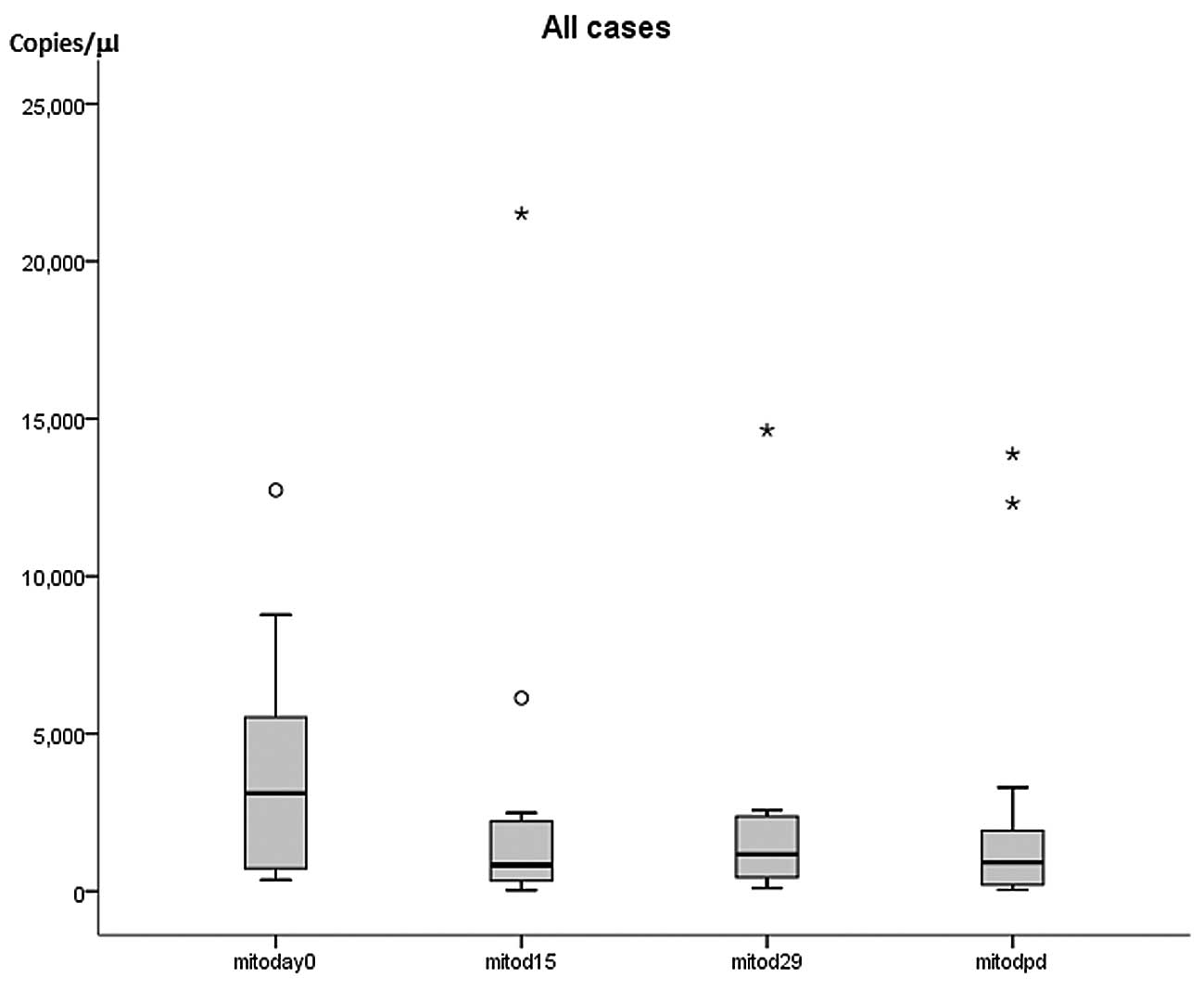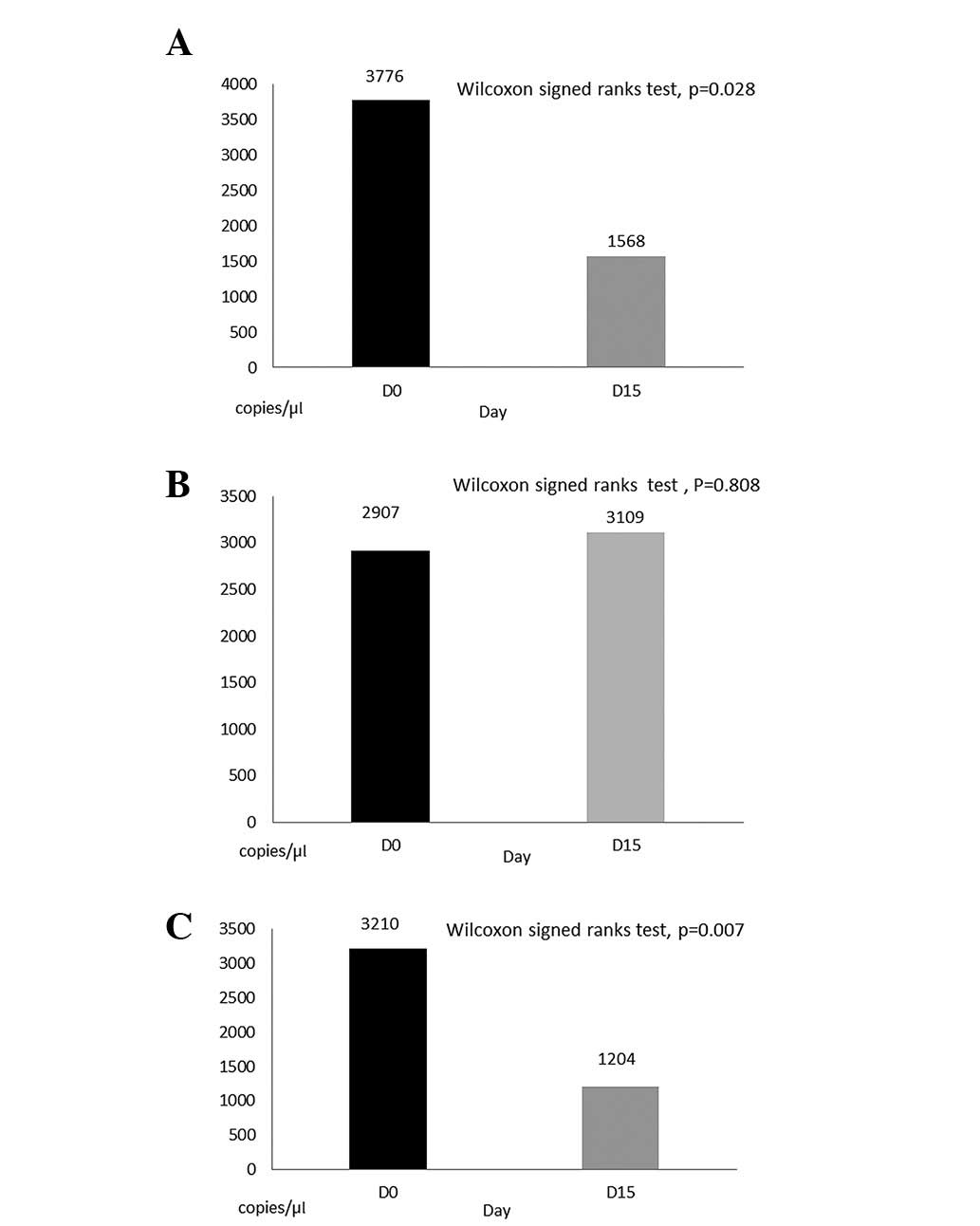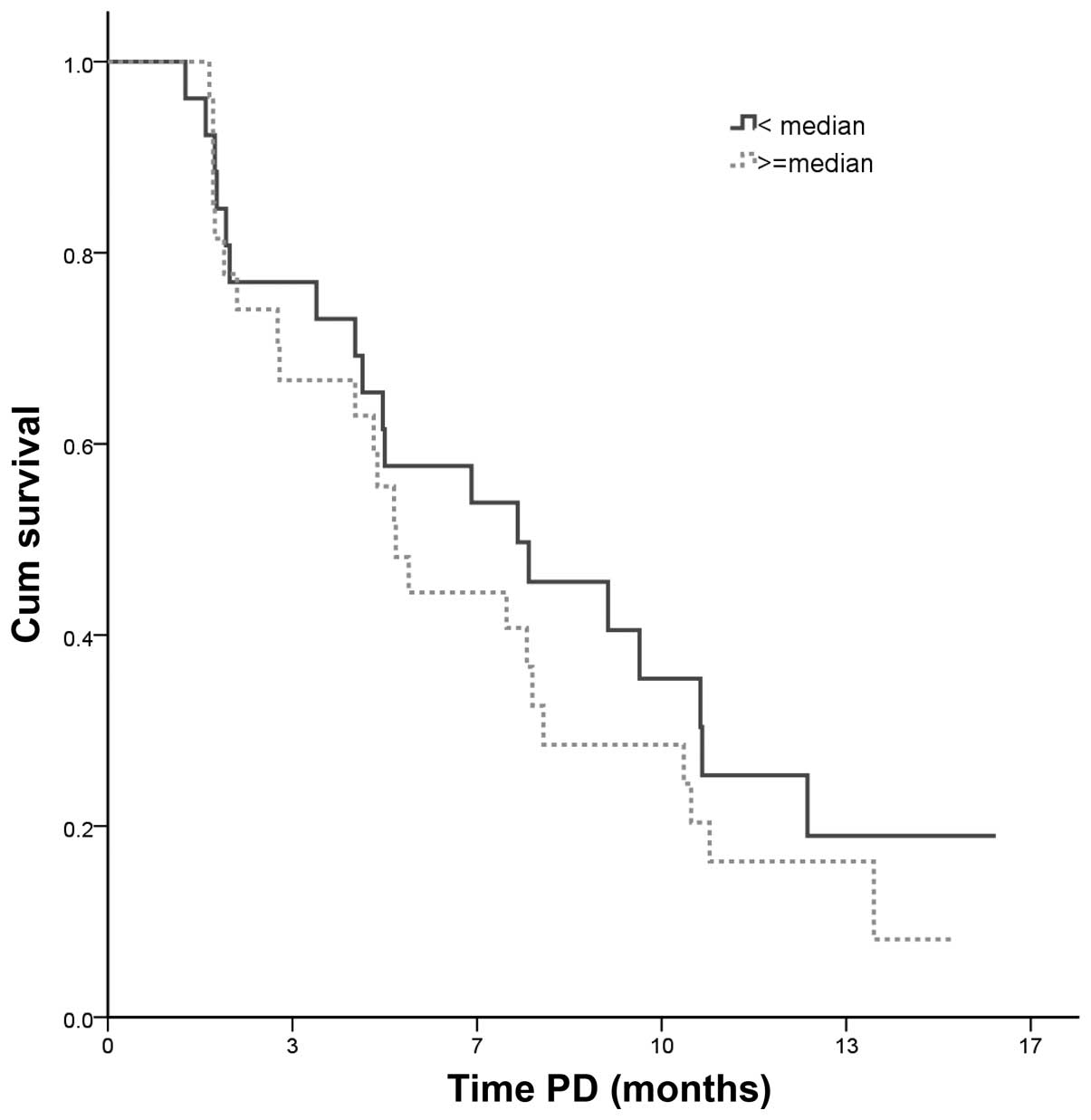|
1
|
Wu CH, Fan WC, Chen YM, Chou KT, Shih JF,
Tsai CM, et al: Second-line therapy for elderly patients with
non-small cell lung cancer who failed previous chemotherapy is as
effective as for younger patients. J Thorac Oncol. 5:376–379. 2010.
View Article : Google Scholar : PubMed/NCBI
|
|
2
|
Paci M, Maramotti S, Bellesia E, Formisano
D, Albertazzi L, Ricchetti T, et al: Circulating plasma DNA as
diagnostic biomarker in non-small cell lung cancer. Lung Cancer.
64:92–97. 2009. View Article : Google Scholar : PubMed/NCBI
|
|
3
|
Pathak AK, Bhutani M, Kumar S, Mohan A and
Guleria R: Circulating cell-free DNA in plasma/serum of lung cancer
patients as a potential screening and prognostic tool. Clin Chem.
52:1833–1842. 2006.PubMed/NCBI
|
|
4
|
Cheng C, Omura-Minamisawa M, Kang Y, Hara
T, Koike I and Inoue T: Quantification of circulating cell-free DNA
in the plasma of cancer patients during radiation therapy. Cancer
Sci. 100:303–309. 2009. View Article : Google Scholar : PubMed/NCBI
|
|
5
|
Mancini M, Anderson BO, Caldwell E,
Sedghinasab M, Paty PB and Hockenbery DM: Mitochondrial
proliferation and paradoxical membrane depolarization during
terminal differentiation and apoptosis in a human colon carcinoma
cell line. J Cell Biol. 138:449–469. 1997. View Article : Google Scholar
|
|
6
|
Ellinger J, Müller SC, Wernert N, von
Ruecker A and Bastian PJ: Mitochondrial DNA in serum of patients
with prostate cancer: a predictor of biochemical recurrence after
prostatectomy. BJU Int. 102:628–632. 2008. View Article : Google Scholar : PubMed/NCBI
|
|
7
|
Zhang R, Shao F, Wu X and Ying K: Value of
quantitative analysis of circulating cell free DNA as a screening
tool for lung cancer: A meta-analysis. Lung Cancer. 69:225–231.
2010. View Article : Google Scholar : PubMed/NCBI
|
|
8
|
Eisenhauer EA, Therasse P, Bogaerts J, et
al: New response evaluation criteria in solid tumours: revised
RECIST guideline (version 1.1). Eur J Cancer. 45:228–247. 2009.
View Article : Google Scholar
|
|
9
|
Vassilakopoulos T, Troupis T, Sotiropoulou
C, Zacharatos P, Katsaounou P, Parthenis D, et al: Diagnostic and
prognostic significance of squamous cell carcinoma antigen in
non-small cell lung cancer. Lung Cancer. 32:137–144. 2001.
View Article : Google Scholar : PubMed/NCBI
|
|
10
|
Suemitsu R, Yoshino I, Tomiyasu M,
Fukuyama S, Okamoto T and Maehara Y: Serum tissue inhibitors of
metalloproteinase-1 and -2 in patients with non-small cell lung
cancer. Surg Today. 34:896–901. 2004. View Article : Google Scholar : PubMed/NCBI
|
|
11
|
Kulpa J, Wójcik E, Reinfuss M and
Kolodziejski L: Carcinoembryonic antigen, squamous cell carcinoma
antigen, CYFRA 21–1, and neuron-specific enolase in squamous cell
lung cancer patients. Clin Chem. 48:1931–1937. 2002.
|
|
12
|
Sozzi G, Conte D, Mariani L, et al:
Analysis of circulating DNA in plasma at diagnosis and during
follow-up of lung cancer patients. Cancer Res. 61:4675–4678.
2001.PubMed/NCBI
|
|
13
|
Sozzi G, Conte D, Leon M, et al:
Quantification of free circulating DNA as a diagnostic marker in
lung cancer. J Clin Oncol. 21:3902–3908. 2003. View Article : Google Scholar : PubMed/NCBI
|
|
14
|
Gai S, Fidler C, Lo YM, et al:
Quantitation of circulating DNA in the serum of breast cancer
patients by real-time PCR. Br J Cancer. 90:1211–1215. 2004.
View Article : Google Scholar : PubMed/NCBI
|
|
15
|
Flamini E, Mercatali L, Nanni O, et al:
Free DNA and carcinoembryonic antigen serum levels: an important
combination for diagnosis of colorectal cancer. Clin Cancer Res.
12:6985–6988. 2006. View Article : Google Scholar : PubMed/NCBI
|
|
16
|
Ziegler A, Zangemeister-Wittke U and
Stahel RA: Circulating DNA a new diagnostic gold mine? Cancer Treat
Rev. 28:255–271. 2002. View Article : Google Scholar : PubMed/NCBI
|
|
17
|
Gormally E, Caboux E, Vineis P and Hainaut
P: Circulating free DNA in plasma or serum as biomarker of
carcinogenesis: practical aspects and biological significance.
Mutat Res. 635:105–117. 2007. View Article : Google Scholar : PubMed/NCBI
|
|
18
|
Laktionov PP, Tamkovich SN, Rykova EY,
Bryzgunova OE, Starikov AV, Kuznetsova NP, et al: Extracellular
circulating nucleic acids in human plasma in health and disease.
Nucleosides Nucleotides Nucleic Acids. 23:879–883. 2004. View Article : Google Scholar : PubMed/NCBI
|
|
19
|
Antonatos D, Patsilinakos S, Spanodimos S,
Korkonikitas P and Tsigas D: Cell-free DNA levels as a prognostic
marker in acute myocardial infarction. Ann NY Acad Sci.
1075:278–281. 2006. View Article : Google Scholar : PubMed/NCBI
|
|
20
|
Pathak AK, Bhutani M, Kumar S, Mohan A and
Guleria R: Circulating free DNA in plasma/serum of lung cancer
patients as a potential screening and prognostic tool. Clin Chem.
52:1833–1842. 2006.PubMed/NCBI
|
|
21
|
Rosell R, Carcereny E, Gervais R, et al:
Erlotinib versus standard chemotherapy as first-line treatment for
European patients with advanced EGFR mutation positive
non-small-cell lung cancer (EURTAC): a multicentre, open-label,
randomised phase 3 trial. Lancet Oncol. 13:239–246. 2012.
View Article : Google Scholar : PubMed/NCBI
|
|
22
|
Punnoose EA, Atwal S, Liu W, et al:
Evaluation of circulating tumor cells and circulating tumor DNA in
non-small cell lung cancer: association with clinical endpoints in
a phase II clinical trial of pertuzumab and erlotinib. Clin Cancer
Res. 18:2391–2401. 2012. View Article : Google Scholar : PubMed/NCBI
|
|
23
|
Penta JS, Johnson FM, Wachsman JT and
Copeland WC: Mitochondrial DNA in human malignancy. Mutat Res.
488:119–133. 2001. View Article : Google Scholar : PubMed/NCBI
|
|
24
|
Jerónimo C, Nomoto S, Caballero OL, Usadel
H, Henrique R, Varzim G, et al: Mitochondrial mutations in early
stage prostate cancer and bodily fluids. Oncogene. 20:5195–5198.
2001.PubMed/NCBI
|
|
25
|
Leon SA, Shapiro B, Sklaroff DM and Yaros
MJ: Free DNA in the serum of cancer patients and the effect of
therapy. Cancer Res. 37:646–650. 1977.PubMed/NCBI
|
|
26
|
Kumar S, Guleria R, Singh V, et al: Plasma
DNA level in predicting therapeutic efficacy in advanced nonsmall
cell lung cancer. Eur Respir J. 36:885–892. 2010. View Article : Google Scholar : PubMed/NCBI
|

















